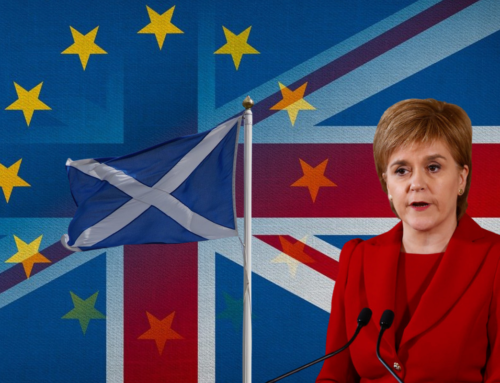BREXIT: THE BEGINNING OF THE END?
16th November 2018
by Brendan Donnelly
Director, The Federal Trust
In the documents released this week by the British government and the EU there is a striking contrast between the detailed and specific nature of the proposed Withdrawal Agreement (WA) and the cursory, imprecise nature of the accompanying Political Declaration (PD.) The WA is a binding legal document, creating bankable rights and obligations. The Political Declaration is a purely aspirational text, pointing towards a range of long-term outcomes for the next stage of the Brexit negotiations, and expressing the pious hope that these outcomes will be as benevolent as possible for all concerned.
The contrast between the WA and the PD should not, over two years after the EU referendum, be entirely surprising. Once the Article 50 notification took place in March 2017 the operation of the Treaty set in train a timetable for creating a Withdrawal Agreement in order to regulate issues arising immediately out of the British decision to leave the EU. No such timetable exists for the conclusion of an agreement between the UK and the EU on the future long-term relationship. Given the chaotic incapacity of the British side to set itself realistic negotiating goals for this relationship it is no surprise that the proposed PD is so vague and noncommittally aspirational. The pressure of the Article 50 timetable on the other hand has produced a solid and coherent text in the shape of the WA.
When the House of Commons votes on the outcome of the Brexit negotiations, its primary vote will be on the WA, and not on the largely rhetorical PD. There are, however, important political and legal linkages between the two documents, despite differences in style and scope. Two linkages are particularly important in this context: those relating to the transition period and to Northern Ireland. These two issues figure importantly in the WA but can only be properly understood when read in conjunction with the PD. In both cases the linkages operate greatly to the disadvantage of the current British government and vividly illustrate the weakness of its position in the Brexit negotiations.
A core delusion of the pro-Brexit campaign was the claim that the UK, once it had left the EU, would be able rapidly to negotiate with the Union a new and favourable trading relationship to replace existing arrangements. This fantasy did not long survive contact with the negotiating realities of Brexit. It rapidly became clear to the British negotiators that renegotiation would be a difficult, arduous process and to all except some of the British negotiators it became clear that the future relationship would be far from the “frictionless trade” sought originally by Mrs. May. Out of this partial recognition was born the acceptance on the British side that it would be necessary for a “transitional” period to be established for the weeks, months or even years after March 2019, when trading relations between the UK and EU would otherwise fall into a legal limbo. A “transitional” period was also attractive to the EU, eager to minimise the economic disruption Brexit would inevitably cause and happy to continue British payments into the EU’s budget until the end of 2020, when the present EU “Multiannual Financial Framework (MFF)” comes to an end.
Never-ending transition?
From the point of view of those most eager to pursue a rapid Brexit, this proposed “transition period” had two principal drawbacks, democratic and financial. During it, the UK would continue to be bound by European regulations and procedures on which it had no say, and it would be obliged to continue substantial British payments into the EU budget. These concerns were met by Mrs. May and her Ministers with two counter-arguments: the transition period would be very short and these continuing budgetary payments would be justified by a speedy and favourable resolution of the negotiations about our future economic and trading relationship. It is now clear from the WA and the PD that the first of these assertions is questionable and the second entirely untrue.
One of the few as yet undefined elements of the WA is the date on which the “transition period” will come to an end. If it continues until the long-term trading relationship between the EU and UK has been defined it could last many years. The PD’s vagueness, moreover, makes it entirely clear that the “transition period” with its continuing budgetary payments and obligation to follow European law and policies has brought the British government precisely nothing in the way of attractive options for that long-term trading relationship. All the EU’s member states are agreed that this future relationship must be demonstrably less favourable to the UK than the current one. The guarded tone of the Declaration well reflects this. The British government is no nearer than it was two years ago to establishing what it would regard as a satisfactory post-Brexit trading relationship.
The Irish dimension
It is precisely this uncertainty about the future trading relationship that underlies the controversial Irish component of the WA. Ireland and other member states are extremely doubtful that it will ever be possible for the British government to be able to negotiate a long-term trading agreement that of itself obviates the need for border formalities of some kind on the island of Ireland. Mrs. May’s red lines about the Customs Union (CU) and the Single Market. seem to exclude any such possibility a priori. The EU was therefore determined from the beginning of the Brexit negotiations to ensure that Northern Ireland would enjoy in all circumstances the integration into the EU’s single market and CU necessary to avoid border formalities at the inner-Irish border. In the agreed final version of the WA Mrs. May has had to concede this reasonable desire of the Irish government. In order to make this concession more palatable to the DUP, she has accepted that the UK as a whole should remain for an undefined period within an ad hoc CU with the EU. In so doing she has failed to placate the DUP and triggered wide-ranging suspicions within her own party that the UK will be trapped indefinitely in a CU.
Much surprise has been expressed by British politicians and commentators that the conclusion of a WA between the UK and the EU should have been significantly retarded and perhaps even frustrated by the single issue of Ireland. Mrs May is reported to have expressed to Messrs. Juncker and Tusk in late 2017 her baffled amazement that the claims of a single small member state in the EU should be capable of derailing such important negotiations as those on Brexit between the UK and the EU as a whole. On that occasion she received an unsympathetic response from her Interlocutors. In fact, the Irish strand of the Brexit negotiations perfectly exemplifies many of the British governmental delusions and errors which have littered the past two years. The British government has grossly overestimated its own leverage in the Brexit negotiations, it has underestimated the solidarity of the EU side and been shocked gradually to discover that in the Brexit negotiations the interests of a small country like Ireland within the EU were every bit as important and decisive as the interests of a larger country like the UK outside the EU.
It has rightly been observed by Donald Tusk and others that the first phase of the Brexit negotiations, those culminating in the Withdrawal Agreement, would present the easiest issues to resolve. Mrs. May could be pardoned for not sharing this analysis. In order to achieve this Agreement, Mrs. May has had to make concessions on the “transition period” and Ireland which have brought her government to the brink of collapse.
Lose-lose
At every turn of the Brexit negotiations until now Mrs. May has found that she lacks attractive answers to the problems she faces. She has only been able to find differently structured unattractive ones. The present WA and PD represent an uneasy temporary point of equilibrium in the maelstrom of national and international pressures bearing down on the Prime Minister. Objectively, they represent no progress towards meeting the central challenge of British politics: establishing a satisfactory and sustainable relationship with the EU after Brexit.
In the unlikely event of her being the British Prime Minister charged with negotiating a long-term relationship Mrs. May will, however, find the dilemmas confronting her yet more intractable than those hitherto. Messrs Tusk and Juncker have repeatedly remarked that there can be no winners in Brexit. Two difficult years have probably led Mrs. May reluctantly to agree with them. If she survives the present crisis within her Party her reward will be to spend an indeterminate number of years trying to limit the damage of Brexit to the UK while being constantly reproached by her party for not contriving its imaginary promised benefits. It can only be a matter of time before her former Foreign Secretary writes a well-paid article in the Daily Telegraph comparing the Prime Minister’s lot to that of Sisyphus pushing a rock for all eternity up a hill, or to Prometheus exposed on a cliff for his liver to be eaten by the eagle.
Such comparisons will be entirely apt but are unlikely to be consoling for Mrs. May. Brexit has created a series of insoluble dilemmas, political, economic and social for the British state. Her response is to continue indefinitely to wrestle, ever more dispiritingly, with these dilemmas. It may be, however, that the manifestly unsatisfactory nature of the compromises she has concluded will provide a moment of stock-taking in the whole Brexit process.
Already voices are being raised arguing that the Prime Minister’s negotiated package is worse than remaining in the EU. From there it is only a short intellectual step to understanding that any negotiated package for Brexit, from this Prime Minister or any other, is much worse than remaining in the EU. It is not inevitable that the UK will continue punishing itself in this way on the basis of a narrow referendum victory won over two years ago on the basis of lies, delusion and a limited franchise. Mrs. May’s likely difficulty in constructing a majority for her WA could well prove a salutary shock to the self-absorbed British Parliamentary system. In an unguarded utterance earlier this week the Prime Minister accepted that “no Brexit” was one alternative to accepting her proposals. She may find it more difficult than she would wish to put that particular genie back in the bottle again . A People’s Vote with an option to “remain” becomes every day a more plausible way out of the impasse.







